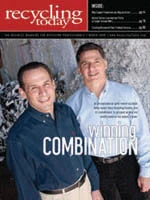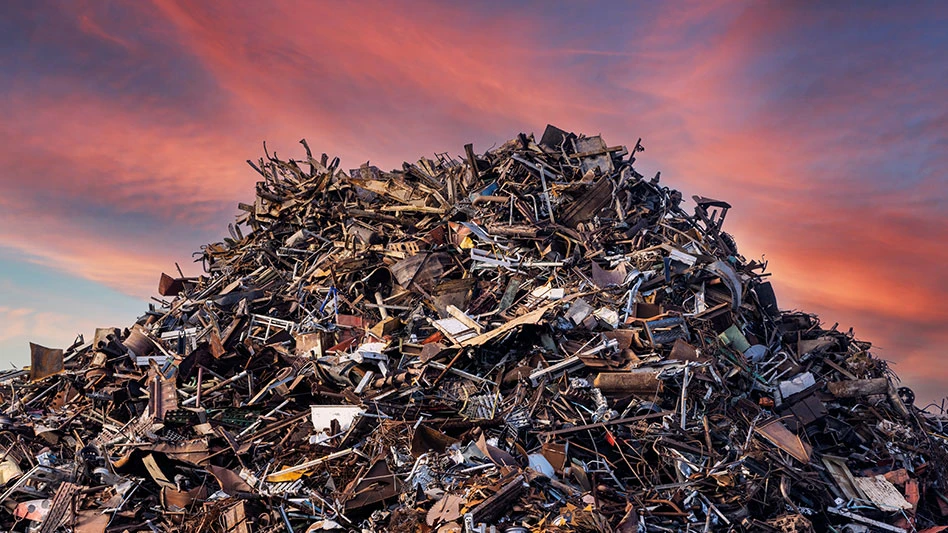John Hennessy, CEO of Nuprecon/CST, Snoqualmie, Wash., says his demolition firm’s acquisition of Maryland-based Marcor Remediation Inc. will create strategic opportunities for the company to expand its presence both geographically and across lines of service.
The newly-combined company will have more than 1,500 employees in 20-plus offices. The company is expected to generate approximately $250 million in annual revenue.
Marcor’s significant presence and resources in the northeastern United States complement the strong West Coast and Southeast presence of Nuprecon/CST, the company states in a news release announcing the acquisition. Marcor will continue to operate under its brand name, according to the release.
John Hennessy and Sage Khara, the founders of Nuprecon and CST respectively, which merged in early 2008, will continue in their executive roles at Nuprecon/CST. Marcor equity holders Dave Jungers, chief operating officer, and Tim Miller, executive vice president, will retain their leadership roles at Marcor and have equity positions in the combined entity.
"One reason we were attracted to Marcor was that Sage had nothing but great things to say about them as a competitor, and that doesn’t always happen in our industry," Hennessy tells Construction & Demolition Recycling.
Hennessy continues, "And certainly we looked at their market share and how the services they provide would complement what we do."
The merger process has started, said Hennessy, including systems integration. "Marcor has spent a lot of time, money and energy on accounting, business development and communication systems, and they have a world-class safety program," he comments. "A primary reason why we liked Marcor is because there are not a lot of differences between it and Nuprecon/CST."
Operationally, Nuprecon/CST provides more depth and capabilities on structural demolition and other "heavy" services, while Marcor’s wide array of remediation techniques and its depth of experience on the environmental side can broaden what Nuprecon/CST offers. At a recent meeting of executives of the two firms Hennessy says that while watching a Marcor slide show he became familiar with niche services Marcor provides "that I never knew they did."
Hennessy says that while there is no question the industry environment is challenging right now, there was no wavering as far as completing the transaction. "The due diligence process is rigorous and expensive and put us both to the test, but there was never really any hesitation that this was the right thing to do."
The continued growth of Nuprecon/CST, says Hennessy makes the company "very unique compared to others in our industry; for people looking for a career with a lot of growth opportunities, I think we’re a destination now."
The transaction was overseen by Nuprecon/CST’s majority owner, Seattle-based Evergreen Pacific Partners, which manages $700 million of equity and invests in what it calls "private, traditional industry, middle-market companies in Western North America."
Nuprecon/CST offers demolition services and a range of turnkey remediation and recovery services, including concrete sawing, drilling, abatement services, C&D material recycling services and site preparation.
In Memoriam: Ralph Cobey
Ralph Cobey, longtime chairman of the board of Galion, Ohio-based Eagle Crusher Co., passed away on Jan. 16. He was 99 years old.
A well-respected businessman and philanthropist, Cobey studied mechanical engineering prior to joining his father’s business, Perfection Steel Body Co., in 1930. The company manufactured truck bodies and hoists, and grew to include a line of farm equipment, hydraulic pumps, garbage lift containers and Eagle Crusher Co., which Cobey bought in 1952. The organization was later named Perfection Cobey Corp.
Eagle Crusher pioneered the construction of the structural steel frame jaw crusher and produced its first portable hard rock crusher in 1928. Today, Eagle Crusher is under the leadership of the third generation of Cobeys in manufacturing.
Cobey supported a number of community-enriching projects, including the Malabar Farm, a state park and demonstration working farm in Lucas, Ohio. Cobey was also an avid supporter of the Boy Scouts of America, hosting annual weekend campouts at his home, Pleasant Valley Farm.
Cobey is survived by his wife of 64 years, two daughters (and sons-in-law) and one grandson. His enthusiasm for his work inspired his daughter Susanne—Eagle Crusher’s current president and CEO—to join the company in 1974. "Listening to him talk about his day was when I became enthralled with the business," she says.
Oregon City Enhances C&D Recycling Program
Starting in 2009 Metro Portland (Oregon) is implementing changes in the processing and disposal of mixed dry waste, primarily C&D debris.
The program, called the Enhanced Dry Waste Recovery Program (EDWRP), was initially developed in 2007 is designed to increase the amount of recyclable materials recovered in the region.
EDWRP requires that all mixed dry waste generated in the region be delivered to a material recovery facility (MRF), ensuring that recyclable materials are first removed from mixed loads before disposal. This required step in processing is projected to raise the region’s recovery rate by 1.25 percent, surpassing the current 55.3 percent recovery rate for Multnomah, Clackamas and Washington counties. The state has set a regional recovery goal for 2009 of 64 percent.
Metro’s two transfer stations and the eight authorized in-region MRFs will continue to accept dry debris. However, unprocessed dry material can no longer go directly to a landfill.
Privately owned Hillsboro Landfill is building a new MRF and will continue to accept debris for processing under a temporary material recovery plan that complies with EDWRP.
Privately owned Lakeside Reclamation Landfill is not authorized to accept dry waste from the Metro region after Dec. 31, 2008. Customers currently taking debris to Lakeside Landfill must instead select a MRF.
Premier Waste UK Signs Landfill Reduction Agreement
The Waste & Resources Action Programme has announced that Premier Waste UK, based in Birmingham, U.K., is the first waste management firm to sign the organization’s Waste to Landfill agreement. The agreement has been put together to cut the amount of construction and demolition material delivered to landfills by 2012.
In deciding to sign up for the agreement, Premier, established in 1988, states that diverting 100 percent of construction, demolition and excavation debris from heading to the landfill is an achievable and realistic target. The company also is able to divert close to 98 percent of its clients’ debris from landfill.
Wayne Clark, operations director at Premier Waste UK, says that signing up to WRAP’s Halving Waste To Landfill agreement was viewed as an important step for the business and that it would help them demonstrate their commitment to best practice and differentiate them in the eyes of their clients.
He says: "We’ve been banging the waste recovery drum for the last seven or eight years, so we were really pleased when we saw that WRAP was launching a framework to help the industry work together more closely and push the boundaries of what can be achieved. Disposal to landfill is becoming an increasingly expensive option, so recovering waste in greater amounts is really the only sustainable answer in the long term—from both an economic and environmental perspective. We’ll be working to increase our diversion rate to 100 percent this year and we think this is an extremely realistic target."
Since it was launched in October 2008, more than 40 organizations have now signed WRAP’s voluntary agreement—including leading clients, developers and contractors such as Land Securities, Defence Estates, retail company ASDA, Bovis Lend Lease and Laing O’Rourke.
More information is available online at WRAP’s Web site www.wrap.org.uk.
BWI Awarded Second Year of $11.2 Million Contract
Budget Waste Inc. (BWI) has announced that its Hopewell Residential Communities Inc. will continue for the second year of a 10-year contract with BWI Holdings Inc. to serve as the exclusive supplier of waste bins and sorting for recycling in the Mahogany community.
Mahogany is being developed by Hopewell Residential Communities Inc. and will, upon completion over a 10 to 15 year period, yield about 8,000 homes in the city of Calgary.
Budget’s contract for Mahogany has an estimated value of $11.2 million.
C&D Facility Opening in Southwestern Florida
The owners of Reliable Roll-Off have decided to build a new C&D recycling facility in Bonita, Fla.
Richard Smith, one of the partners in Reliable, says the plant is in the process of obtaining operating permits and could break ground on a building within the next three months. He hopes the 2 1/2 acre facility will be taking in material by early next year. The facility will be able to handle 500 tons of material per day.
The company also has been in discussions with some equipment manufacturers to provide the equipment that will be used to process the collected material. One piece of equipment the company will focus on is a grinder, which will allow the company to make a compostable material from some green debris, wood and even gypsum.
EPA Issues Brownfields Grants
Thirteen communities in 12 states will share $2.6 million in job training grants geared toward cleaning up contaminated properties. The U.S. Environmental Protection Agency’s (EPA) Brownfields Program is awarding grants of $200,000 each to nonprofit organizations, workforce investment boards and state and local governments.
The grants will teach environmental assessment and cleanup job skills to individuals living in areas near browfiends sites in Arkansas, California, Connecticut, Illinois, Indiana, Maryland, Massachusetts, Michigan, New Jersey, Oregon, Tennessee and Wisconsin.
"EPA’s Brownfields Program is helping revitalize and restore neighborhoods nationwide," says EPA Administrator Stephen L. Johnson. "These grants will help community members convert contaminated land into sources of public pride."
Congress Could Boost C&D Recycling, Deconstruction
A bill introduced to the U.S. House of Representatives in January could offer support for deconstruction. The Community Regeneration, Sustainability and Innovation Act of 2009 (CRSI) has been designed to create a new program within the U.S. Department of Housing and Urban Development (HUD) targeted toward cities experiencing large-scale property vacancy, abandonment and population losses.
The act’s supporters say it will provide assistance to communities to start or expand land banks that establish public control over vacant and abandoned property so that property can be redeveloped or otherwise used in ways to "benefit the public."
A summary of the CRSI act, prepared by its authors, says, "The Community Regeneration Act would encourage innovation, experimentation and environmentally sustainable practices through collaborative efforts to reuse land bank properties in ways that will provide long-term benefits to the public, whether it is through the creation of green infrastructure, economic development or other strategies."
Brad Guy, a deconstruction consultant and former president of the Building Materials Reuse Association, says he was pleased to have been asked to provide input for the language of the bill as it relates to deconstruction, reuse and recycling. The act, as currently proposed, says an allowable use of funding is for it to go toward the "establishment of recovered building materials reuse and recycling infrastructure, facilities, and technical support."
Another allowable use of funds is for the "establishment of local government purchasing requirements for deconstruction to make use of existing building materials stock in new and rehabilitation construction."
In areas where land banking has created a portfolio of vacant properties, the act also says that both the "deconstruction and demolition of vacant and abandoned properties" and the "demolition and removal of public infrastructure" can be funded.

Explore the March 2009 Issue
Check out more from this issue and find your next story to read.
Latest from Recycling Today
- Altilium produces EV battery cells using recycled materials
- Brightmark enters subsidiaries of Indiana recycling facility into Chapter 11
- Freepoint Eco-Systems receives $50M loan for plastics recycling facility
- PET thermoform recycling the focus of new NAPCOR white paper
- Steel Dynamics cites favorable conditions in Q1
- Hydro starts up construction in Spain
- Green Cubes unveils forklift battery line
- Rebar association points to trade turmoil





